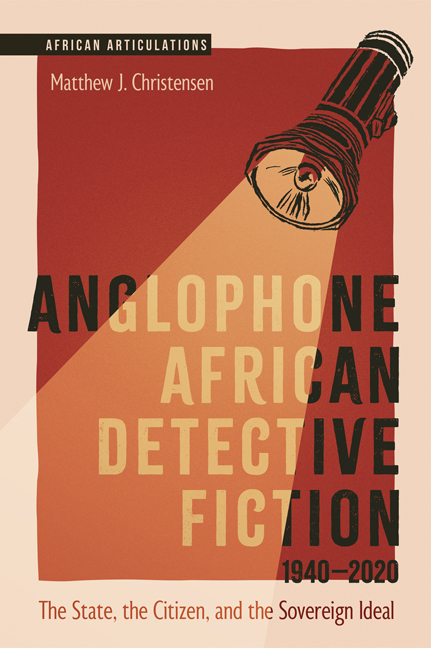Book contents
- Frontmatter
- Dedication
- Contents
- List of Illustrations
- Acknowledgements
- Introduction
- Part 1 Africanizing Detective Fiction’s Un/Sovereign Subjects
- Part 2 Neoliberal Noir
- Conclusion: The Future Imperfect
- An Anglophone African Detective Fiction Bibliography, 1940–2023
- Bibliography
- Index
- Miscellaneous Endmatter
Introduction
Published online by Cambridge University Press: 11 May 2024
- Frontmatter
- Dedication
- Contents
- List of Illustrations
- Acknowledgements
- Introduction
- Part 1 Africanizing Detective Fiction’s Un/Sovereign Subjects
- Part 2 Neoliberal Noir
- Conclusion: The Future Imperfect
- An Anglophone African Detective Fiction Bibliography, 1940–2023
- Bibliography
- Index
- Miscellaneous Endmatter
Summary
Nigerian novelist Kole Omotoso pinpoints the central challenge facing African detective fiction writers, namely ‘how to prosecute the people who are powerful enough to totally ignore the process of law. The private dick angle doesn't work; somebody has to do more than this’ (1979: 10). The conflict between the classic British whodunit's implicit promise of legal justice and the entrenched fallibilities of Nigeria's judicial system animates Omotoso's claim. For him, the scenarios and resolutions of the typical British mystery cannot credibly accommodate Nigerian realities. To plausibly provide the pleasures of suspense and catharsis, detective stories must reflect the worlds in which their readers live. Omotoso's example of legal accountability for the rich and powerful is less uniquely African than he suggests as other global crime mysteries play on the same dynamic. He also overlooks the elasticity of the ‘private dick angle’ to account for a wide range of social and judicial scenarios, including the Nigerian situation. Yet Omotoso's question about how African detective fiction writers will represent the law and the courts, notions of criminality and justice, and the relationship between the citizen and state more broadly signals the imperative for African writers to interrogate what kinds of stories their detective fiction should tell and, most significantly, to what ends.
By the early 1940s, African writers had already begun answering Omotoso's question. Rather than replicate British manor-house mysteries with little more than an Africanization of character names, the earliest writers turned the tyrannies of colonial policing and the challenges of achieving equitable justice under colonial judiciaries into rich material for suspenseful and convincing detective stories. Over time, other African writers would do the same with the criminalization of state institutions by self-dealing politicians, the authoritarianism of military rule, and the neoliberal elevation of unbridled selfinterest to a public virtue. Ghana's R.E. Obeng was possibly the first to reimagine the detective genre for an African context, in 1942, with his collection of mystery stories featuring the detective Issa Busanga. Nigeria's Cyprian Ekwensi followed Obeng later in the decade with his first two investigation narratives and was joined in the 1950s and ‘60s by writers from South Africa, Ghana, and Ethiopia.
- Type
- Chapter
- Information
- Anglophone African Detective Fiction 1940-2020The State, the Citizen, and the Sovereign Ideal, pp. 1 - 26Publisher: Boydell & BrewerPrint publication year: 2024



